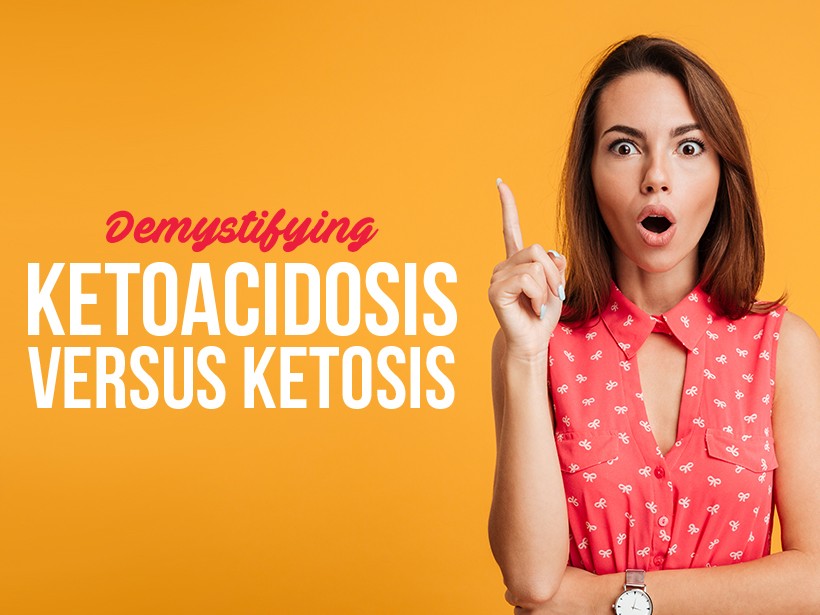In order to understand the benefits of the ketogenic diet and the process associated with it, you should understand what it isn’t: ketoacidosis. Ketoacidosis occurs in both non-diabetic and diabetic cases and denotes high levels of water-soluble ketone bodies which leads to acidic blood. This relates to type 1 diabetes because this form of diabetes is essentially a result of insulin deficiency.
Normal Physiology and Insulin
Insulin is normally needed to allow your cells to absorb glucose which is used for energy and normal functioning cells.1 In these cases, your body produces ketone bodies at your liver during fatty acid metabolism so your brain, cardiac and skeletal muscle tissues can use them for fuel when your body cannot import glucose.
Diabetic Ketoacidosis
How is this different from ketosis? Ketone bodies are always present in your blood, but under diabetic conditions, these bodies increase to pathological levels while the body still cannot use glucose. So, how prevalent is ketoacidosis? What are the risks? In a study of children and adolescents in Israel with Type 1 diabetes, Eyal et. al. studied diabetic ketoacidosis (DKA) to identify risk factors. Interestingly enough, it was found that age, maternal origin, and paternal education levels were all factors in the development of diabetic ketoacidosis.2
More in depth, the Type 1 diabetics in the study had higher levels of ketoacidosis (35.6% in Israel) than those in other developed countries, which the researchers thought was due to a low level of awareness of DKA (0.024% in the US). Younger patients were also more affected which the authors attributed to higher levels of dehydration, a fast decline of Beta cells in the liver that produce insulin, and the reduced ability of younger individuals to compensate metabolically for the acidosis.
Non-Diabetic Ketoacidosis
In some cases, pediatric patients can suffer from non-diabetic ketoacidosis. In a study by Bai et al, 5 patients with non-diabetic ketoacidosis were studied.3 They were dehydrated, had poor appetite, and had Kussmaul breathing. Kussmaul breathing is a fancy medical term meaning deep labored breathing that has to do with acidosis. When the blood becomes acidic, it causes a shift in your body’s system that regulates your blood pH. Long story short, the acidity initiates a chemical reaction that converts acidic compounds to carbon dioxide. What does your body do with carbon dioxide? It pushes it out through your lungs. As your body is trying to compensate for this high acidity in your blood, it makes you breathe harder to get out the carbon dioxide.
Clearing Up Confusion
In ketosis, a normal, healthy biological process, your body produces manageable levels of ketones. In ketoacidosis, patients are treated via insulin and glucose administration to correct ketoacidosis in order to have normal functioning physiology. These two states couldn’t be any more different: ketosis and ketoacidosis. One wreaks havoc on your body and the other allows you better health and controlled weight loss. They’re not to be confused.
NUTRITIONAL DISCLAIMER
The content on this website should not be taken as medical advice and you should ALWAYS consult with your doctor before starting any diet or exercise program. We provide nutritional data for our recipes as a courtesy to our readers. We use Total Keto Diet app software to calculate the nutrition and we remove fiber and sugar alcohols, like erythritol, from the total carbohydrate count to get to the net carb count, as they do not affect your blood glucose levels. You should independently calculate nutritional information on your own and not rely on our data. The website or content herein is not intended to cure, prevent, diagnose or treat any disease. This website shall not be liable for adverse reactions or any other outcome resulting from the use of recipes or recommendations on the Website or actions you take as a result. Any action you take is strictly at your own risk.
- Research Shows Improvement in Anorexia Nervosa Condition With Keto - August 6, 2018
- New Potential for Ketogenic Diet to Prevent Alcohol Withdrawal Syndrome - August 1, 2018
- Woman on Early Menopause Saved By Keto - July 25, 2018




